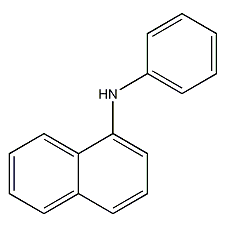
Structural formula
| Business number | 0227 |
|---|---|
| Molecular formula | C16H13N |
| Molecular weight | 219.28 |
| label |
N-phenyl-α-naphthylamine, anti-aging agent, Neozon A, N-phenyl-α-naphthylamine, Antioxidant A, Antonio cases A, Anti-aging agent |
Numbering system
CAS number:90-30-2
MDL number:MFCD00003878
EINECS number:201-983-0
RTECS number:QM4500000
BRN number:2211174
PubChem number:24846634
Physical property data
1. Properties: The pure product is white to light yellow diamond-shaped or flaky crystals, which gradually turns purple when exposed to sunlight and air.
2. Relative density (g/mL, 25/4℃): 1.18~1.22
3 . Relative vapor density (g/mL, air=1): Not determined
4. Melting point (ºC): 62
5. Boiling point (ºC, normal pressure): Not determined
6. Boiling point (ºC,): 335℃ (0.0344MPa), 226℃ (1.07kPa)
7. Refractive index: Undetermined
8 . Flash point (ºC): 188
9. Specific rotation (º): Not determined
10. Autoignition point or ignition temperature (ºC): Not determined
11. Vapor pressure (kPa, 25ºC): Undetermined
12. Saturated vapor pressure (kPa, 60ºC): Undetermined
13. Heat of combustion (KJ/ mol): Undetermined
14. Critical temperature (ºC): Undetermined
15. Critical pressure (KPa): Undetermined
16. Oil and water ( Log value of the partition coefficient (octanol/water): Undetermined
17. Explosion upper limit (%, V/V): Undetermined
18. Explosion lower limit (%, V/ V): Undetermined
19. Solubility: Easily soluble in acetone, ethyl acetate, benzene, carbon tetrachloride and ethanol, soluble in gasoline, slightly soluble in water.
Toxicological data
None
Ecological data
None
Molecular structure data
Molecular property data:
1. Molar refractive index: 73.46
2. Molar volume (cm3/mol): 189.5
3. Isotonic specific volume (90.2K): 504.4
4. Surface tension (dyne/cm): 50.1
5. Polarizability (10 -24cm3): 29.12
Compute chemical data
1. Reference value for hydrophobic parameter calculation (XlogP): None
2. Number of hydrogen bond donors: 1
3. Number of hydrogen bond acceptors: 1
4. Number of rotatable chemical bonds: 2
5. Number of tautomers: none
6. Topological molecule polar surface area 12
7. Number of heavy atoms: 17
8. Surface charge: 0
9. Complexity: 232
10. Number of isotope atoms: 0
11. Determine the number of atomic stereocenters: 0
12. Uncertain number of atomic stereocenters: 0
13. Determine the number of chemical bond stereocenters: 0
14. Number of uncertain chemical bond stereocenters: 0
15. Number of covalent bond units: 1
Properties and stability
Easily soluble in ethanol, ether, acetone, chloroform, carbon disulfide and ethyl acetate. Slightly soluble in gasoline, insoluble in water. Flammable and toxic!
Gradually turns purple when exposed to sunlight and air.
Storage method
This product should be sealed and stored in a cool place.
Synthesis method
It is obtained by the condensation of 1-naphthylamine and aniline at 250℃ under the catalysis of p-aminobenzene sulfonic acid. Put aniline, p-aminobenzenesulfonic acid, and melted 1-naphthylamine into the condensation pot, conduct condensation at 250°C, and carry out fractionation after the reaction is completed. Aniline is evaporated under low vacuum into the mixed fraction (applied), and the split point of the fraction is determined based on the measured freezing point of the fraction. Steam out the antioxidant A and high boiling matter. The molten antioxidant A is cooled, sliced, and packaged to become the finished product. Raw material consumption (kg/t) 1-naphthylamine (99%) 710 aniline (99.2) 425

Purpose
This series of aromatic secondary amine antioxidants. Used in natural rubber, diene synthetic rubber, and chloroprene rubber. It is a universal antioxidant for reclaimed rubber and is also used in chloroprene latex. It has good protective effect on heat, oxygen, flexion, weather aging and fatigue. Chloroprene rubber also has anti-ozone aging properties and has a certain inhibitory effect on harmful metals. This product is often used together with other antioxidants such as AP, DNP, especially 4010 and 4010N. It is easily dispersed in dry glue and easily decomposed in water. The solubility in rubber is as high as 5%, and there will be no blooming when the dosage is 3-4 parts. Due to its pollution, migration and darkening properties in sunlight, it is not suitable for white and light-colored products. It is mainly used in the manufacture of tires, rubber hoses, tapes, rubber rollers, rubber shoes, submarine cable insulation, etc. In the plastics industry, this product can be used as a heat stabilizer for polyethylene. Industrial products are toxic because they contain 1-naphthylamine and aniline.
It is a non-polluting hindered phenol antioxidant with the characteristics of low volatility, high thermal oxygen resistance and good compatibility with polymers. , has no effect on the polymerization reaction when used. However, it is polluting and will turn the rubber material into dark brown under sunlight. It can be used as an antioxidant for natural rubber, synthetic rubber, styrene-butadiene rubber latex, and an antioxidant for high-impact polystyrene, polyvinyl chloride, polyamide, polyacetal, polyurethane, ABS resin, AS resin, etc. The dosage is 0.3 %~1%. It has ozone aging resistance in neoprene. The reference dosage is 1 to 2 parts by mass. It has a strong synergistic effect when used together with thioether antioxidants and phosphorus-containing antioxidants. When used in polyvinyl chloride and high-impact polystyrene, it can also be added to the monomer before polymerization.

 微信扫一扫打赏
微信扫一扫打赏

